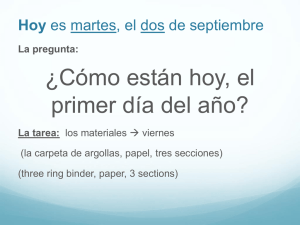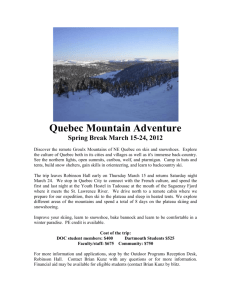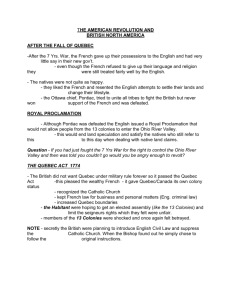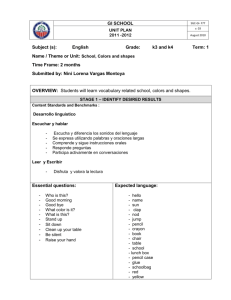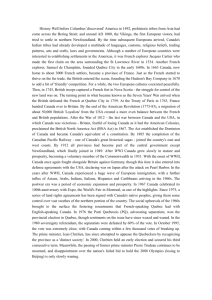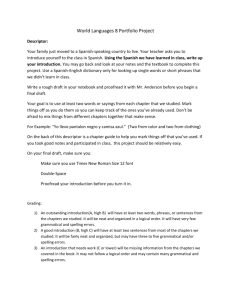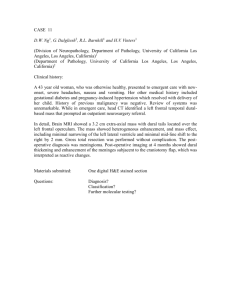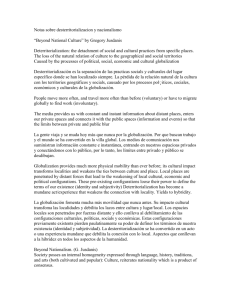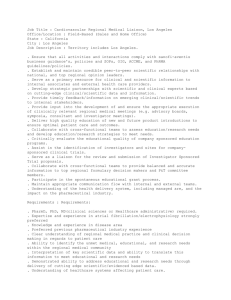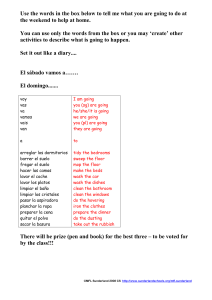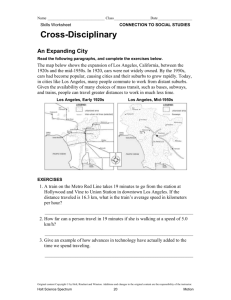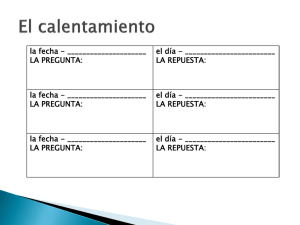IN1_U5_tarea
advertisement
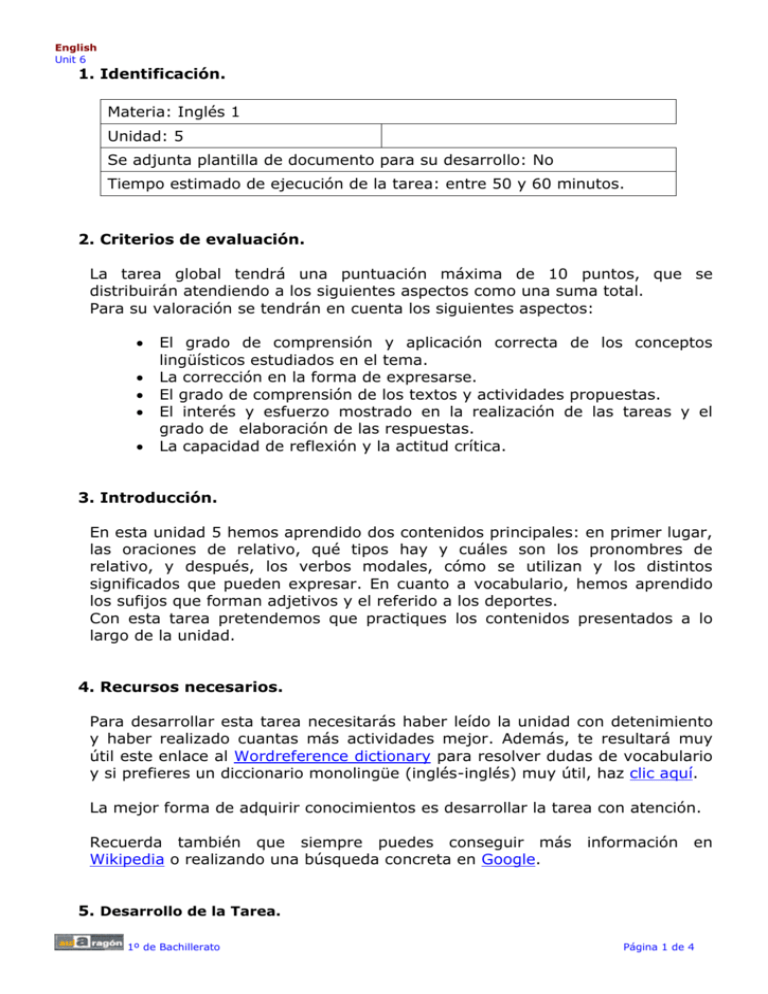
English Unit 6 1. Identificación. Materia: Inglés 1 Unidad: 5 Se adjunta plantilla de documento para su desarrollo: No Tiempo estimado de ejecución de la tarea: entre 50 y 60 minutos. 2. Criterios de evaluación. La tarea global tendrá una puntuación máxima de 10 puntos, que se distribuirán atendiendo a los siguientes aspectos como una suma total. Para su valoración se tendrán en cuenta los siguientes aspectos: El grado de comprensión y aplicación correcta de los conceptos lingüísticos estudiados en el tema. La corrección en la forma de expresarse. El grado de comprensión de los textos y actividades propuestas. El interés y esfuerzo mostrado en la realización de las tareas y el grado de elaboración de las respuestas. La capacidad de reflexión y la actitud crítica. 3. Introducción. En esta unidad 5 hemos aprendido dos contenidos principales: en primer lugar, las oraciones de relativo, qué tipos hay y cuáles son los pronombres de relativo, y después, los verbos modales, cómo se utilizan y los distintos significados que pueden expresar. En cuanto a vocabulario, hemos aprendido los sufijos que forman adjetivos y el referido a los deportes. Con esta tarea pretendemos que practiques los contenidos presentados a lo largo de la unidad. 4. Recursos necesarios. Para desarrollar esta tarea necesitarás haber leído la unidad con detenimiento y haber realizado cuantas más actividades mejor. Además, te resultará muy útil este enlace al Wordreference dictionary para resolver dudas de vocabulario y si prefieres un diccionario monolingüe (inglés-inglés) muy útil, haz clic aquí. La mejor forma de adquirir conocimientos es desarrollar la tarea con atención. Recuerda también que siempre puedes conseguir más información en Wikipedia o realizando una búsqueda concreta en Google. 5. Desarrollo de la Tarea. 1º de Bachillerato Página 1 de 4 English Unit 6 ING1-05-audio04 Read and listen to the text and then answer the questions below. By Djof, C. Commons In Canada, Paco had to choose a few places to visit. He landed in Ottawa, as you know, and he decided to visit some spots nearby. He would like to visit Quebec too but he could not go everywhere he wanted. The guide from the walking tour in Ottawa told him that it was a really nice place. Quebec is the only province that has a predominant French identity. Here the only official language is French, and most of the population is francophone. The capital city shares the name with the province and it is regarded as a very European city. In case he went to Quebec, the guide recommended him to visit Old Quebec. This district is a UNESCO World Heritage which is full of history. Once here, he should visit the Fortifications that surround this area, and the Citadel. From this place, one can admire the astonishing views. With all these amazing descriptions, Paco told him that he was not sure of his route and said that he might still change his plans. Another nice neighbourhood in Quebec is called Petit-Champlain. This is a place that reminds people of a French village in past times. Some nice houses can be visited here, such as Maison Chevalier, a house from the 18th century which was completely restored, or a house that belonged to Louis Jolliet, the man who discovered the Mississippi. Finally, another interesting area in the city is the Old Port and Place Royale. The port is a very attractive place both for tourists and for locals. It is full of shops, galleries and cafés. Unfortunately, Paco missed Quebec in the end. But he might come back to Canada one day! Who knows? 1º de Bachillerato Página 2 de 4 English Unit 6 1. Answer the following questions about the text: a. Did Paco finally go to Quebec? _____________________________________________ b. Why did Paco get so interested in this city? _____________________________________________ c. What can people do if they visit the Fortifications in Quebec? _____________________________________________ d. What is Petit-Champlain? _________________________________________________ 2. In this text, you can find different modal verbs. What are these sentences? _______________________________________________________ 3. What are the meanings of each of the modal verbs found in this text? (ability, obligation, prohibition, deduction, possibility, advice…) _______________________________________________________ 4. In the text there are also examples of defining relative clauses. Find them and write them underneath: _______________________________________________________ 5. Find words in the text that match the following definitions. a. Most frequent or common ____________ b. Use jointly or in common ____________ c. If there happens to be need ____________ d. A district where people live ____________ 6. Choose the correct alternative: a) He should/could go to the park. He doesn’t know yet. 1º de Bachillerato Página 3 de 4 English Unit 6 b) Can/May I help you, sir? c) Sarah must/can see a doctor immediately. d) Can/May you drive? e) It must/can be freezing in Nunavut. f) They don’t have to/ mustn’t do their homework for tomorrow. They have a whole week g) You mustn’t/shouldn’t talk when the teacher is talking. h) Sarah can/could swim when she was four. 7. Rewrite the sentences using a relative pronoun. Omit this pronoun if it is possible. 1. She spoke to the man. This man had repaired her car. 2. We bought a house. John showed us the house. 3. James lives in Manchester. His mother died last week. 4. He lent me “Millennium”. And I read it immediately 8. Write the right adjective for these words. Use the correct suffix Example: ORIGIN ---- ORIGINAL MUSIC ____________ FRIEND ____________ SUCCEED ____________ ATTRACT ____________ NOISE ARTIST AMBITION CONFIDENCE ____________ ____________ ____________ ____________ 9. Write a for and against composition Travelling alone or with a companion Write a composition on this topic. Remember the rules you have learnt in this unit about how to write a for and against composition. Use connectors and follow the ideas you already know. 6. FORMATO Y PROCEDIMIENTO DE ENTREGA. Completa un documento de texto con tus respuestas a las distintas tareas. Una vez terminado el documento y cuidadosamente revisado, lo enviarás a tu profesor (preferiblemente via e-mail en un fichero adjunto) en los plazos establecidos en la agenda de aularagon. 1º de Bachillerato Página 4 de 4
